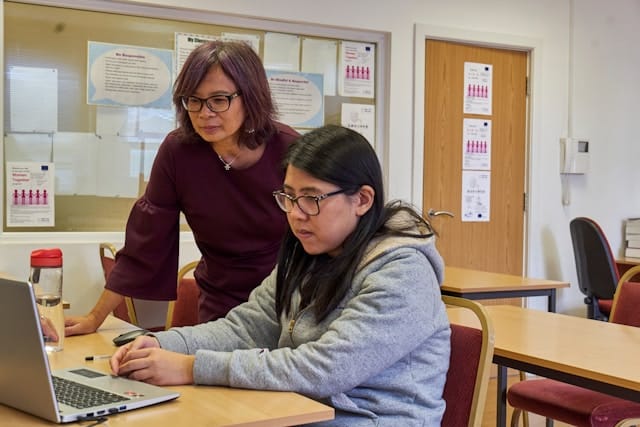Can AI Personalize Learning for Students with Special Educational Needs?

In the constantly evolving world of education, the quest for effective teaching methods never ends. The introduction of artificial intelligence (AI) in educational systems has opened up a world of opportunities, especially for students with special educational needs. But can AI truly cater to the personalized learning needs of these students? Let’s delve into this intriguing question.
The Rise of AI in Education
Artificial intelligence is no longer a concept reserved for science fiction novels and futuristic movies. In reality, AI is rapidly integrating into our daily lives, significantly impacting various sectors, including education. It’s transforming the way educators teach, learners learn, and educational institutions function.
In parallel : How Do Interactive Virtual Museums Enhance Historical Education?
AI-based educational technology tools are designed to help educators and students achieve their goals more effectively and efficiently. With these tools, teachers can provide personalized content and learning experiences that cater to each student’s unique needs and preferences. They can also use data collected by these systems to gain insights about students’ learning progress and adapt their teaching strategies accordingly.
AI has potential to be a game-changer for students with special educational needs. These students often require a more tailored approach to education compared to their peers. AI can possibly deliver this personalized learning experience, but how?
Also to discover : What Strategies Optimize Solar Panel Efficiency in Varied Climates?
Personalized Learning through AI
The concept of personalized learning is not new. However, the advent of AI has given it a fresh perspective. AI-based systems can analyze vast amounts of data, recognize patterns, and make predictions.
In the context of education, these capabilities can be incredibly valuable. Think about it: an AI-powered system could analyze a student’s learning history, identify their strengths and weaknesses, and adapt the educational content accordingly. This kind of personalized approach could be particularly beneficial for students with special educational needs.
AI can also support the creation of adaptive learning paths. Using data on each student’s progress, AI systems can suggest the next best steps for them. This way, learners can progress at their own pace, working on areas where they need more support and skipping over content they’ve already mastered.
Potential Challenges and Solutions
Despite its promising features, the implementation of AI in education comes with its own set of challenges. For one, data privacy concerns loom large. Schools and educators must ensure that the data collected by AI systems are used responsibly and securely.
Additionally, while AI can help tailor educational content to each student’s needs, it cannot replace the human touch in education. Educators play a crucial role in providing emotional support and encouragement, which AI systems are currently incapable of.
Another challenge is ensuring AI solutions are inclusive and don’t exacerbate existing inequalities. For example, students from low-income families may not have access to the same technological resources as their more affluent peers. Similarly, students with disabilities may require assistive technologies to interact with AI-based learning systems.
To overcome these challenges, schools and educators can work in tandem with technology developers to create AI tools that are secure, ethical, and inclusive. They should also remain committed to a blended learning approach, combining the best of AI with traditional teaching methods.
The Future of AI in Special Education
Given the untapped potential of AI, it’s exciting to think about how it could revolutionize special education in the future. Perhaps we’ll see AI systems that can simulate one-on-one tutoring sessions, providing instant feedback and adapting in real-time to a student’s needs. Or maybe we’ll witness the development of AI-powered assistive technologies that can help students with disabilities navigate the digital learning environment more easily.
It’s clear that AI has the potential to significantly enhance personalized learning for students with special educational needs. But it’s equally important to approach this prospect with caution. Proper implementation of AI in education requires careful consideration of ethical issues, data privacy, and inclusivity concerns. As we move forward, we must strive to harness the power of AI in a way that truly benefits all learners, ensuring each student receives the support and opportunities they deserve.
As we have explored, AI’s potential in the field of education, particularly in special education, is monumental. It offers the promise of truly personalized learning experiences, tailored to the unique needs and abilities of every student. However, realizing this potential requires careful, thoughtful implementation, with a focus on ethical considerations and inclusivity. The journey may be complex, but the possibilities are truly exciting.
AI-Driven Personalized Learning: A Closer Look
Indeed, the world of artificial intelligence is complex, but its potential benefits for special education are immense. At the heart of this advancement is the concept of AI-driven personalized learning. But what does this entail?
AI-driven personalized learning refers to the use of AI technologies to tailor educational content and experiences to individual students’ learning styles and needs. This is achieved through the analysis of vast amounts of student data, revealing key insights into a student’s strengths and weaknesses, learning styles, and pace.
For instance, consider intelligent tutoring systems. These AI-powered systems provide personalized instruction to students, adapting in real-time to their responses. If a student struggles with a particular concept, the system can provide additional resources or change its teaching approach. On the other hand, if a student excels in a certain area, the system can introduce more challenging content to keep them engaged and motivated.
The potential of such technologies in special education is enormous. They could offer students with special educational needs the opportunity to learn at their own pace, receive immediate feedback, and engage with content tailored to their unique learning needs. However, it’s important to remember that machines can’t replace human educators. Teachers still play a crucial role in providing emotional support, motivation, and guidance to students.
The Road Ahead: Privacy, Inclusivity, and Ethical Considerations
While the potential benefits of AI in special education are exciting, it’s crucial to address the possible challenges and ethical considerations that come with this technology.
One of the main concerns surrounds data privacy. With AI systems collecting and analyzing vast amounts of student data, schools and educators must ensure that they are handled responsibly and securely. They must comply with data protection laws and adopt best practices for data security.
Inclusivity is another significant issue. AI should be accessible to all students, regardless of their socioeconomic background or disabilities. Schools should strive to provide equal access to AI technologies, and developers should work on creating adaptive learning systems that accommodate various learning styles and abilities.
Ethical considerations also extend to the design and use of AI technologies. For instance, how do we ensure that AI systems are unbiased? How do we guarantee that they enhance, rather than hinder, the learning experiences of students with special educational needs?
As we navigate these challenges, it’s important to remember the ultimate goal: to harness the power of AI to enhance personalized learning for all students. This journey may be complex, but with careful planning and consideration, we can ensure that AI serves as a powerful tool in special education.
Conclusion
The integration of artificial intelligence in education, and particularly special education, presents a world of opportunities for personalized learning. By tailoring educational content to each student’s unique learning needs and styles, AI has the potential to transform the learning experiences of students with special educational needs.
However, this promising future comes with its own set of challenges. The ethical implications, data privacy concerns, and inclusivity issues must be at the forefront of discussions about AI in education.
The road to successfully integrating AI in special education may be complex, but with careful planning and a commitment to ethical considerations, this technological revolution can yield remarkable benefits. It is an exciting time for education, and the future is full of possibilities. As we continue to explore and understand the potential of AI, it’s clear that this technology could be a game-changer in delivering a more inclusive and personalized educational experience for all.
